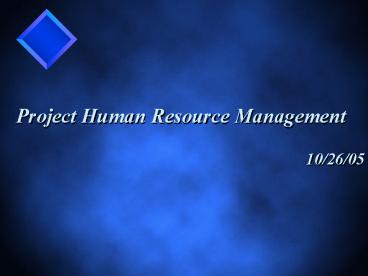Project Human Resource Management - PowerPoint PPT Presentation
1 / 35
Title:
Project Human Resource Management
Description:
Your impression of the Management Functions chapter. What did you ... DE JURE. DE FACTO. OR LEGAL. OR IMPLIED. AUTHORITY. AUTHORITY. AUTHORITY. CHARTER. PROJECT ... – PowerPoint PPT presentation
Number of Views:82
Avg rating:3.0/5.0
Title: Project Human Resource Management
1
Project Human Resource Management
10/26/05
2
Review Assignments
- Your impression of the Management Functions
chapter - What did you take-away?
- My impression
3
Maslows Hierarchy Of Needs
SELF-ACTUALIZATION
SELF-ESTEEM
SOCIAL / BELONGING
SAFETY
PHYSIOLOGICAL
4
Human Resource Management Whos Involved
- Project Client Team
- Roles and Responsibilities
- Senior Management Steering Committee
5
Senior Management Steering Committees
6
Customer-Contractor/Client Communication
Contractor/Client
Customer
Informal
Sponsor
Sponsor
Formal
Project
Project
Manager
Manager
Informal
Employees
Employees
7
Whats Involved
- Project Authority
- Interpersonal Influences
- Barriers to Project Team Development
8
Definitions
- Authority is the right of an individual to make
the necessary decisions required to achieve his
objectives or responsibilities. - Responsibility is the assignment for completion
of a specific event or activity. - Accountability is the acceptance of success or
failure.
9
Project Authority
- What is project authority?
- What is power and how is it achieved?
- How much project authority should be granted to
the project manager? - Who settles project authority interface problems?
10
Types Of Project Authority
DE JURE
DE FACTO
OR LEGAL
OR IMPLIED
AUTHORITY
AUTHORITY
PROJECT
CHARTER
AUTHORITY
11
Interpersonal Influences
- Legal Power
- Reward Power
- Penalty Power
- Expert Power
- Referent Power
12
Types of Power
- Legal authority the ability to gain support
because project personnel perceive the project
manager as being officially empowered to issue
orders. - Reward power the ability to gain support
because project personnel perceive the project
manager as capable of directly or indirectly
dispensing valued organizational rewards (i.e.,
salary, promotion, bonus, future work
assignments).
13
Types of Power (Continued)
- Penalty power the ability to gain support
because the project personnel perceive the
project manager as capable of directly or
indirectly dispensing penalties that they wish to
avoid. Penalty power usually derives from the
same source as reward power, with one being a
necessary condition for the other.
14
Types of Power (Continued)
- Expert power the ability to gain support
because personnel perceive the project manager as
possessing special knowledge or expertise (that
functional personnel consider as important). - Referent power the ability to gain support
because project personnel feel personally
attracted to the project manager or his project.
15
Power/Authority Problems
- Poorly documented or no formal authority
- Power and authority perceived incorrectly
- Dual accountability of personnel
- Two bosses (who often disagree)
- The project organization encouraging
individualism - Subordinate relationships stronger than peer or
superior relationships - Shifting of personnel loyalties from vertical to
horizontal lines
16
Power/Authority Problems (Continued)
- Group decision making based the strongest group
- Ability to influence or administer rewards and
punishment - Sharing resources among several projects
17
Capacity Planning
Anticipated Growth
Current Staff
Manpower
Proposals
Manpower Requirements
Planning Horizon
Time
18
Capacity Planning
19
Human Resource Management
- Staff Assignment
- Motivation
- Staff Leveling
- Personnel Management
- Team Development and Stages
20
Staff Assignment
- Task or People related
- Define the skills you need and match to the
people who have identified having this skill - Find the people you want and work their skills
into the project - Would you rather have an expert technical person
or a people-savvy management person?
21
Motivation
- How does staffing, Motivation, etc work at Target?
22
Motivating
- A feeling of pride or satisfaction for ones ego
- Security of opportunity
- Security of approval
- Security of advancement, if possible
- Security of promotion, if possible
- Security of recognition
- A means for doing a better job, not a means to
keep a job
23
Professional Needs
- Interesting and challenging work
- Professionally stimulating work environment
- Professional growth
- Overall leadership (ability to lead)
- Tangible rewards
- Technical expertise (within the team)
- Management assistance in problem-solving
- Clearly defined objectives
24
Professional Needs (continued)
- Proper management control
- Job security
- Senior management support
- Good interpersonal relations
- Proper planning
- Clear role definition
- Open communications
- A minimum of changes
25
Motivation
- Adopt a positive attitude
- Do not criticize management
- Do not make promises that cannot be kept
- Circulate customer reports
- Give each person the attention he requires
26
Motivation
- Giving assignments that provide challenges
- Clearly defining performance expectations
- Giving proper criticism as well as credit
- Giving honest appraisals
- Providing a good working atmosphere
- Developing a team attitude
- Providing direction
27
Non-financial Awards/Recognition
With non-financial awards, employees may receive
cash-equivalent items, but not cash-in-hand.
28
Staff Leveling
- Staff allocation
29
Resources
- Money
- Manpower
- Equipment
- Facilities
- Materials
- Information/technology
30
Personnel Management
- Employee-Manager Problems
31
Management Pitfalls
- Lack of self control knowing oneself
- Activity Traps
- Managing vs Doing
- People vs Task Skills
- Ineffective Communications
- Time Management
- Management Bottlenecks
32
Communications Defined
- Effective project communication is needed to
ensure that we get the right information to the
right person at the right time using the right
media and the right format and in a
cost-effective manner.
33
Team Development and Stages
34
Quote
- An expert is a person who has made all the
mistakes that can be made in a very narrow field.
35
Assignments due by COB 10/31/05
- Reading Project Management by Kerzner 8th
edition. chapter 4, pg139-184 - Answer questions 4-33, 4-35, 4-43, 4-45, 4-47.
Please submit by COB 10/31/05. - Final presentation in class10 minutes each































